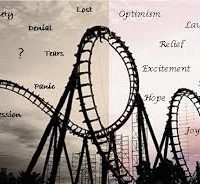Clinical Evidence
The Skinner box experiments provided a rat with access to nearby socialization, to toys and to food it could obtain by pressing a lever. When food was dispensed each time they pressed the lever, they were happy, stable, sociable. But just like one who is “led on” those in control began to dispense food only at random. The rat, driven by survival instincts, soon became obsessed with the lever. It no longer socialized or played. The rat became so obsessed with the lever it would try-try-try to exhaustion, dehydration and starvation. Their attachment to the lever can relate to our ability to attach and try to be enough. To get the reward and reinforcement of being wanted and loved.
Why do people struggle against abuse and stay?
Fears over finances and family are major considerations, but confusion, fear, insecurity fostered by the intermittent reinforcement is too. It can alter our base behavior, needs and drive to survive. This is often the reason people stay in abusive relationships…beyond reason, even when others try to help them get away.
It isn’t about logic, it’s about the lever. They relate the relationship with survival. Don’t believe there’s anything to live for if they lose it. Intermittent reinforcement can lead to attachment disorders that overpower even survival instincts. Scary, but real.
Be honest with our partner. True to ourselves. A great mantra.
Own up. End the tug of war. Make up your mind, then speak up.
Being led on can consist of receiving just enough attention and reinforcement to cause such a shift to an attachment disorder, plummeting self-esteem…these are not conscious decisions. Whatever the intention, leading someone on is manipulation. Living a lie. It’s damaging and real, until we’re aware and brave enough to step back, be ruthlessly honest with ourselves, stop making excuses, and are willing to walk away.
We never want to believe someone we love is lying to us. We don’t want to call them a liar unless we know for sure and even then they often tell us if we were better, they’d be nicer. Blame shift. Toss us the shovel so we’ll dig ourselves in deeper.
Sometimes leading someone on isn’t malicious, it’s fear or cowardice to let go unless there is something or someone to go to. We signed up, vowed to stay, can’t untangle the mess, but we’re miserable and making them miserable and have a personal decision to make and own.
It is hard to be the one to break up, to tell a nice person you’re not in love with them. It’s difficult to decide to change both your lives. People who stay in unhealthy, unhappy relationships risk hurting themselves and their partner. Honesty can be brutal, but your integrity is at stake.
Danger Zone.
This blog is not a ‘get out of jail free card’ for users; those character disordered narcissists or psychopaths tempted to share it as vindication. “I did her/him a favor dumping them.” If you’re one of those, integrity is not something you value. If you’re dealing with one of them, educate yourself. Check out my blogs. Other great resources are http://psychopathsandlove.com , http://UniversallyUs.com, and clinical psychologist Elinor Greenberg’s website, http://ElinorGreenberg.com She’s the real deal.
Good guys and gals.
If you’re simply struggling with whether to leave a relationship or leading on a partner once you’re no longer in for the long haul I hope the above gives you things to consider. I’d love your input, mistakes you’ve learned from. That seems to be my method these days…learning from mistakes. Perhaps we can pool them and learn from one another.
For me…I’ve been through the fire, not only survived, but am thriving. Now single and dating, I hold myself accountable. Just did. Had to own up and break up with a good man after a six month relationship. Made my confused mind acknowledge my feelings, then spoke up kindly, but clearly.
The echoes of experience do keep me alert. 🙂
My best wishes,
Alex






